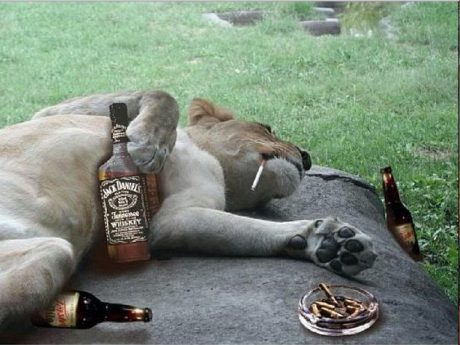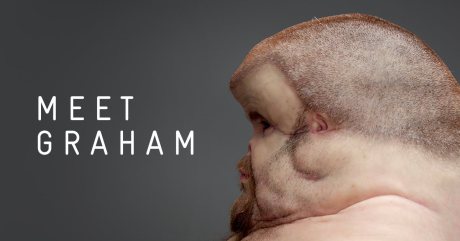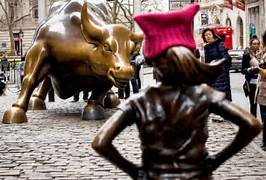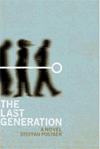Bogusky and me: a deep conversation by the shallow end
August 13, 2018

Some years ago, I had the pleasure of conversing with Alex Bogusky before he became a demi-God of Advertising.
We were at a vendor-sponsored pool party in Cannes. Unlikely as it seems, both of us were not really digging the scene. He seemed to prefer a quiet discussion versus living it up in the shallow end. I was more torn on the issue but also more than happy to oblige him.
For the record, later that week, Alex and his namesake agency would win handfuls of Lions, including the Grand Prix for a charming spot from Ikea called Lamp. Crispin Porter and Bogusky were in the middle of an epic run making them perhaps the most famous ad agency on earth.
But Alex wasn’t interested in talking about prizes.
 Bogusky / file pic from that period
Bogusky / file pic from that period
Like a lot of executive creative directors (myself included), he’d come to Cannes simply because he could. However, he now admitted to being unsettled by the attention he and his agency were getting. He confessed that this would likely being his last time at Cannes.
“Steff,” he said, “we’ve got plenty of swimming pools in Miami.” (This was before CP&B moved its main office to Boulder.) Then he added, “I find that I like doing work more than celebrating it.”
I’m paraphrasing from memory, but this was my favorite bit. Ironic commentary coming from the man who would later write Hoopla (a book about fame in marketing), and probably win more Lions than any other person or agency in the United States.
Yet, to me, Bogusky’s ambivalence about all of it seemed indicative of a higher power beginning to work in his life: that making work, really good work, was more important than drinking champagne and toasting about it.
Bigger picture Alex was also discovering the persistent headache and clashes of conscience that hedonism invoked. Lessons I would learn the hard way.
Later that year, Alex resigned from his agency to pursue other interests. Now he’s taking back the creative reigns at his namesake agency. Prodigal son returning or is something else going on? I know I’m not the only one who looks forward to finding out!
Author’s Note: A version of this story appeared previously in ReelChicago

A story of Lions and Excess…
The Cannes International Festival of Advertising is finis. All over Adland people are back at their shops tweaking layouts, creating and debating Power Points and churning out banners. The business of marketing continues. Yet the hangover persists. Not from the overpriced rose’ in Cannes but from its overwrought festival. In the wake of Publicis’ controversial decree to forgo one year of entering work into Cannes or any other awards show, a hazy doubt remains, wafting in it lingering questions about the role of award shows, the cost to participate, and the value they provide.
No doubt award shows had their place, back when work was difficult to share and people harder to connect. But in the age of social media, nothing could be farther from the truth. Everyone sees everything. Shit is condemned. Cream rises to the top. By the time an ad wins an award it has been praised or vilified ad nauseam. Awards have become anti-climactic. Gilding the Lily if you will. Of course recognition is critical for agencies and their people. But claiming prizes well after the fact is antiquated.
But there’s another mitigating fact. Award shows cost a ton of time and money for agencies to participate. I think more than an App named Marcel, this is the real reason Publicis CEO, Arthur Sadoun pulled the plug. In these increasingly difficult times, he saw millions of dollars in savings. The bottom line is the bottom line.
And for this, we cannot blame him. I believe it costs around a thousand dollars to enter a piece of work at Cannes into a sole category. And there are thousands of categories with more every year. Nearly 1,500 Lions were given out this year. Out of God knows how many entries. You do the math. Agencies desperation to win coupled with outright greed by award show executives created a perfect storm. One must pay to play. The gross is gross.
I don’t think award shows should go away –necessarily- but clearly they need to be brought down to earth. There are too many shows with too many categories. Period.
Forget the many losers at Cannes. Let’s look at two of the biggest winners.

“Meet Graham”

“Fearless Girl”
Clemenger BBDO Melbourne was awarded 29 Lions & 2 Grand Prix for their “Meet Graham” campaign. McCaan New York received 18 Lions and 4 Grand Prix for their “Fearless Girl” statue on Wall Street. No question these are wonderful and deserving ideas. But 18 and 29 Lions? That’s icing on the icing on the icing. We may crave the sugar but it’s not good for anyone. Except, of course, the executives at Cannes. They’ll gladly exchange statues for cash.
If only a handful of Lions were given out they would mean so much more. But the current system demand quantity. The solution: Make the show a salon for great work and only give the most brilliant a prize. More like the film festival, which takes place a month before. Hell, if they can do it so can we. I know it’s a tough pill for the many profiteers to swallow. But it’s the right thing to do.
For copy, content and creative direction: https://steffanwork.wordpress.com/

One Lion is apparently enough.
The great irony from the Cannes International Festival of Advertising is that by far the biggest story coming from this famously bloated bacchanal is that the new leader of Publicis Group, Arthur Sadoun decreed in the forthcoming year zero euros will be spent on advertising award shows! Instead, Publicis has introduced a Siri-like App called Marcel (named after Publicis’ founder), which will unite the holding company’s agencies into a “Power of One.” Furthermore, Arthur stated unequivocally that all the monies that would’ve normally gone into entering award shows (extravagant fees, production for entries, and travel) will now be used to create, optimize and deliver Marcel. Here is the video introducing Marcel. No comment.
As everyone (accept apparently Arthur) expected the reaction was fast, furious and mostly vitriolic. Some of that is here.
So much to unpack…
Rather than vivisect the top paragraph like everyone else in Adland, let’s pick out a few tidbits from the carcass. First, why on Earth would a French advertising concern make such a controversial announcement at the biggest advertising festival in the world…in France no less? For publicity? Mission accomplished, Art. But doing so is, well, rude. Dare I say French?

Les Creatives? Let them eat cake!
And to justify the move by claiming an Intranet App, seemingly only for Publicis employees, should somehow take precedent is just plain bizarre. There are already a zillion ways to share files and connect. Does Publicis really need a proprietary one? But fine. I’m sure it will provide some utility. Yet linking it with a budget cutting agenda (pork) feels like the worst kind of governance.
Lost in the melee is this business of “Power of One.” Really? Christ, when I was at the former other big French holding company, Euro RSCG (now HAVAS), the “Power of One” was their big, swinging dick. It was the main part of Euro’s credentials and in all of our pitches. Trotting it out now is trite and oblivious.
All this being said, I’m actually for the decree. You heard me. And yes, for the usual reason: that we are an ego-maniacal industry with a profound inferiority complex. Saluting our wares in show after show became pathetic years ago. Yet like addicts we can’t stop.
But here’s a better reason. Advertising award shows are no longer necessary. If and when good work becomes part of popular culture, the so-called conversation, that is all the accolades one needs. It will be heralded in countless venues. Shared by industry wags and real people alike. A lot.

Why do I need a Lion when I rattled this bull?
McCann’s timely “Fearless Girl” statue was the talk of the town well before winning Lions at Cannes. Not winning would have been the only story. Ergo it was already a winner. Its creators were celebrated and undoubtedly got fat raises and job offers. Cannes is merely icing on the icing. The sugar high is fleeting and unhealthy. We creatives may crave the perk but we don’t need it.
Back in the day, before the Internet and social media, shows like Cannes were more vital. Save for the occasional marketing column, It was the only place things got shared. Now, it’s the last place things get shared.
So good on you Publicis. Throw a harpoon into the whale. (Yeah, a bunch of Global Creative Directors may go down with it. But honestly their salaries are where the real savings will come.) Your timing sucks and the cold turkey will too but measures like this are frankly overdue. Let’s see if Arthur can withstand the shit storm of junkies that have already begun pounding on his door.
For award winning work hit me up: https://steffanwork.wordpress.com/

“You’re in the great game now…”
Adweek published a story asking the big winners at Cannes 2016 what their “secrets to success” were. You could read the article here or just stay with me and I’ll tell you how to win at Cannes. Forget analysis and trendspotting. Don’t be mystified by all the never-ending categories either. Winning at Cannes has more or less relied on the same formula for years.
First and foremost, do great work. Then get it seen and talked about. This one-two punch, by the way, is the same formula for ANY awards show.
Ideally, at least some of your great work should be real. Real means it went through the gauntlet known as your client (not to mention your agency’s often debilitating process) was brilliantly produced, ran in genuine media, and received boffo results.
Enter the shit out of it.
But, dear friends, you know as well as I do, that it doesn’t end there.
Long ago intrepid creatives learned how to game the system. At first simple cheating, what this looks like now is far more, shall we say, ornate. Boiled down it means mimicking the legitimate. Something like this: Create gorgeous work, share it with select others internally, maybe have a friendly client smile at it wistfully, then run it on your own dime somewhere cost efficient or, even free, like posters at the local coffee shop or via some innocuous website. Take a bunch of pictures of it “in situation,” make a case study video and voila: you have award show bait!
Enter the shit out of it.
Professional winners have huge budgets for entering shows and a complicit team doing it. Mixing in fake campaigns with real creates a juggernaut that is hard to untangle. A few real pieces win; a few scams. Who knows which is which? Who cares – the agency clearly does good work.
Be part of a network that knows all the ins and outs. Networks have a regular, sustained presence and they will massage the process to help you win. Networks know people in high places. Networks get judges into shows. Networks have wags who do interviews, predictions and the like i.e. Global Creative Directors. Networks do PR. Networks spend money.
Gaming the system has become the system. Varying degrees of corruption are tolerated for the greater good. A few unfortunates get caught and thrown to the –ahem- lions. The rest is the rest. If it looks like a winner and comes from a winner then, by golly, it is a winner!
The agencies that won the most at Cannes do all of the above, legitimately and otherwise. Been this way for years.
DDB chief blows smoke at Cannes…
Amir Kassaei is the Chief Creative Officer of DDB Worldwide, one of the shinier jewels in Omnicom’s empire of advertising and marketing services companies. Like a lot of creative generals, he spent last week in Cannes taking part in the International Advertising Festival, which, to replay the metaphor, is by far the shiniest jewel in the ever growing necklace of advertising award shows.
Mr Kassaei, perhaps flush with Rose’, also found time to go on record with some provocative accusations and opinions regarding the integrity of the juries at Cannes. He more or less states that certain jurors have a clear mandate to “kill off” competing work, regardless of its quality, if said work emanates from a competing agency. He claims this mandate is at the holding company level. This corruption does not sit well with Kassaei and he goes on record saying that they (DDB) need to have a “serious discussion” about participating in future Cannes if the behavior continues. Paraphrasing the creative director, he claims other less creative minded agencies are willfully endeavoring to “buy” their creative reputations by rigging juries. There’s plenty of texture to his arguments and I urge you to watch the video, even if his sipping of wine and the passing by of beach traffic grates.
As I tweeted earlier, my reaction to this is a cross between “WTF?” and “Duh!” On the one hand I’m appalled by Kassaei’s allegations. Like it or not, creative reputations are made by winning Lions at Cannes. To know that these prestigious trophies can be bought is repellant. What is more sad are all the legitimate submitters who may have lost out on their one shot at gold because of wheeling and dealing behind closed doors. But let’s not be naïve. We’ve known about these shenanigans for a long time. Indeed, when I judged the Dubai Lynx (the Cannes of the Middle East), I saw it first hand. I blogged that “all the good work was fake and all the real work was awful.” Understandably, that blog caused fervor and I was asked to remove it. Reluctantly, I did. Needless to say, I won’t be invited back to judge this festival anytime soon.
While creating and entering scam ads is an entirely different form of awards show corruption, and a pervasive one at that, knowing that judges and juries are culpable takes it to whole ‘nother level. Corroborating Kassaie’s accusations, here’s basically how it works. Through back channels and PR manipulation, agencies vie to get their creative superstars on juries. Once these individuals are confirmed, they are then sequestered to look at all the work coming from the various agencies within their network. They are then asked to vote, if at all possible, on these submissions. Since that is generally not allowed the next best move is to try and vote out the competition, which is a process that cannot really be monitored. And so it goes.
While I’d like to think my peers and I would never do such things a kind of nationalistic fervor happens in those darkened jury rooms, not unlike the ugly pride one sees during international soccer tournaments. Fouls and transgressions happen and they feed a growing fire. The urge to win Lions takes over. In the name of their agencies and even countries, good men do bad things.
The football analogy is apt. FIFA is constantly embroiled in corruption controversy, to say nothing of its countless dumbass fans degrading themselves in the name of competition. In America, the New Orleans Saints are currently dealing with charges of “head hunting” on the football field. And like the manufacture of false great ads (scams), athletes from all sports are being busted regularly for taking steroids and other illegal enhancement drugs. Corruption at all levels.
Yet, unlike professional sports, the general public (except maybe in Brazil) doesn’t give a shit about advertising awards. Relatively speaking, the media attention is minimal. Therefore, corruption buds like unchecked dandelions. And if the governing bodies of big time award shows are complicit, then you have zero integrity. Which is exactly what Amir Kassaei is suggesting.




 The Happy Soul Industry
The Happy Soul Industry The Last Generation
The Last Generation